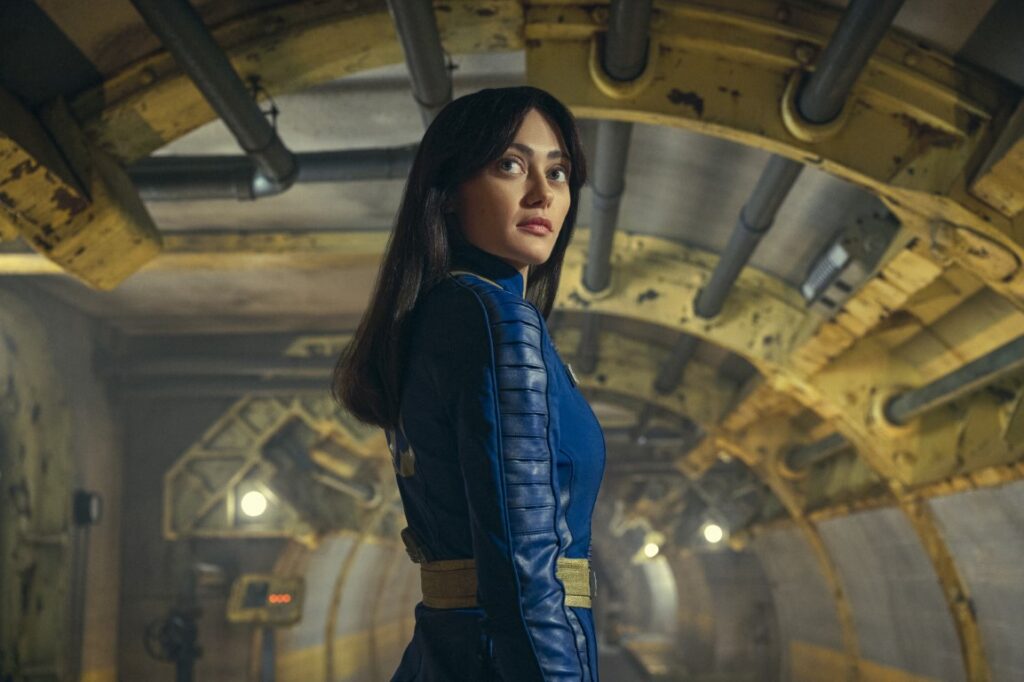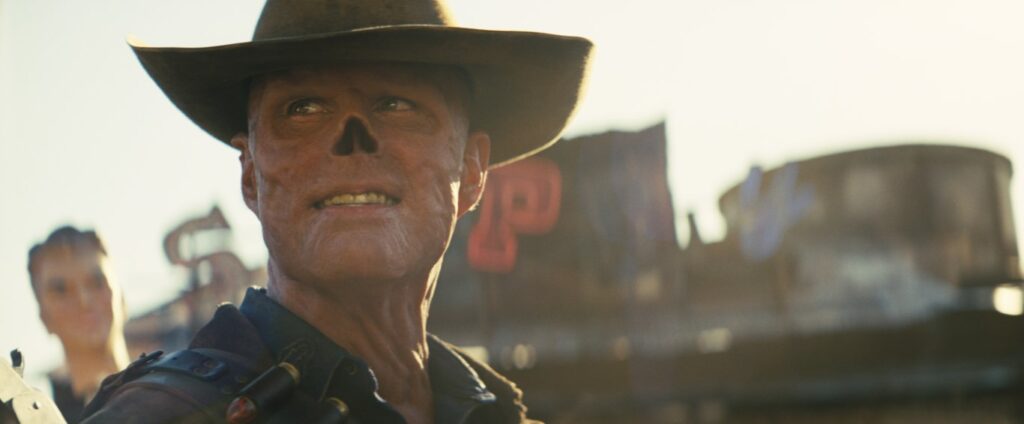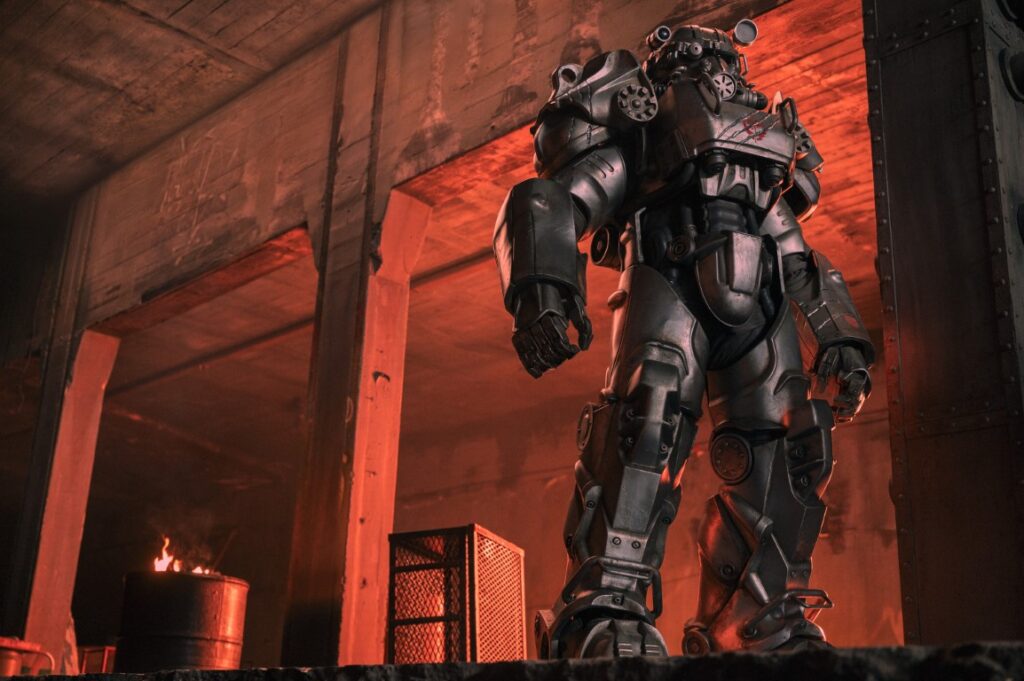Read also:
How to Watch FX Live Without CableHow To Watch AMC Without CableHow to Watch ABC Without CableHow to Watch Paramount Network Without CableFew titles in the world of video game RPGs are as stylistically significant and cherished by fans as Interplay Entertainment’s Fallout. First published in 1997, the post-apocalyptic RPG has spawned countless sequels (including the acclaimed Fallout: New Vegas) and garnered millions of devoted fans through meticulous worldbuilding and its (now signature) atomic age-inspired retrofuturist aesthetic.
Thanks to shows like The Last of Us proving naysayers wrong and paving the way for high-budget, critically acclaimed video game adaptations, Prime Video has joined forces with Bethesda to bring the Fallout franchise to the small screen with an eight-episode series of the same name. Bolstered by source material with a baked-in sense of aesthetics and a pair of winning leads in Ella Purnell and Walton Goggins, Fallout is a clever, twisted apocalyptic odyssey that soars as both a video game adaptation and a standalone series.
Starring Purnell, Goggins, and Aaron Clifton Moten, Fallout follows Lucy (Purnell), an idealistic, sheltered “Vault Dweller” who has spent her entire life in an idyllic vault built to keep wealthy Americans happy and healthy in the event of nuclear devastation. When surface raiders disrupt her vault’s peaceful existence and kidnap her father, Lucy is forced to leave the safety of Vault 33, encountering all manner of unlikely enemies and allies along the way.

As a video game, Fallout’s mechanics encourage unique, unrestrained gameplay. The story isn’t aimless, but it is player-driven, which gives showrunners attempting to adapt the series the unenviable task of cooking up a cohesive, eight-episode narrative that fits within the conventional television framework. But just as Dungeons and Dragons: Honor Among Thieves successfully brought RPGs to the big screen, Fallout carefully crafts a trio of tritagonists who encompass the most iconic elements of the franchise while also functioning as compelling original characters.
More Girl Scout (or Disney princess) than GI Jane, Lucy makes for a refreshing, constantly surprising protagonist. While her goody-goody attitude and straight-laced sensibilities make her ill-equipped for the surface world, she has a surprising steel at her core and an unflinching willingness to brave the horrors of the apocalypse, even if she knows she’s woefully unprepared.
There’s a cheeky, almost surrealist sense of humor to the writing of the vault dwellers that makes them compelling as both comedic and dramatic characters—a strange dichotomy that’s emblematic of the show’s signature brand of combining cheery, candy-colored 1950s aesthetics with grotesquely creative fits of violence and brutality. The Vault Dwellers are sheltered and guileless, yet militaristically efficient and hypersexual (there’s a healthy dose of cousin sex jokes in the first episode) while also managing to be sincere and empathetic.
It’s a bizarre combination of qualities that perfectly captures the tone of the Fallout games. As Lucy, Purnell can somehow deliver all the right comic beats and sell the ridiculousness of the character’s upbringing while making such a strange world feel lived-in and familiar. Though we laugh at Lucy’s idealistic notions about how she will better the surface world and roll our eyes as she walks headfirst into danger, we never stop caring about or rooting for her. It’s a testament to Purnell’s incredible capacity as a performer that she’s so effortlessly able to flirt that line.

The grizzled, world-weary veteran to Lucy’s bright-eyed ingenue is The Ghoul (Goggins), a noseless, radiation-deformed bounty hunter with a talent for violence and a dark past that hides an unlikely connection to the vaults. Foul-mouthed, brutal, and profit-driven, The Ghoul is a classic archetypical outlaw whose prickly exterior is undercut by a series of flashbacks that explore his peaceful, pre-apocalypse life as a pre-war Western actor.
Goggins sells the menacing, sardonic side of The Ghoul (watching him hack, chop, and blast his way through enemies is a frequent, bloody highlight of the series), but there’s a solemn, reluctantly noble heart he brings that makes him especially compelling. Though he may present himself as a crass, merciless mercenary, we’ve seen the capacity for love and softness he has (or once had), and through quiet moments and lingering stares, Goggins offers peeks at the long-dead family man behind The Ghoul.
With Lucy accounting for the vault dwellers and The Ghoul representing the game’s, well.. ghouls, Aaron Moten rounds out the trio of leads as Maximus, a member of Fallout’s Brotherhood of Steel faction. Though the worldbuilding of a post-apocalyptic order of Knights (complete with clerics and squires) who don mech suits to fight crime is certainly entertaining, Maximus as a character struggles to carry the same weight as The Ghoul and Lucy, whose multifaceted personalities and idiosyncratic charms make them much more endearing than the boyish, manipulative, often cowardly Maximus.
Beyond Lucy, The Ghoul, and Maximus, Fallout populates its world with all manner of strange, often comic, always entertaining supporting characters who often embody the anti-capitalist critique of Americana the Fallout games explore. Michael Emerson’s Dr. Wilzig is a memorable standout for his tenure traveling with Lucy, while Matt Berry lends his signature vocal flair to well-meaning surgical droid Mr. Handy. All manner of featured extras do quite a bit of heavy lifting in helping to flesh out the bizarre, neurotic nature of drug-addled surface dwellers, just as Zach Cherry and Rodrigo Luzzi sell the squeaky-clean, gullible Vault Dwellers.

But just as ghouls, brotherhood knights, and Vault Dwellers are crucial to the DNA of Fallout games, so is the use of music and production design, both of which soar under the direction of Westworld co-creators Jonathan Nolan and Lisa Joy. From the ’50s-inspired vaults (swathed in Vault Boy motivational posters) to surface shanty towns decorated with toilet lids and irradiated corpses, production designer Howard Cummings injects his vision of the atompunk apocalypse with equal parts gruesome horror and colorful Americana.
Just as mid-century standards and classic country are a Fallout signature, the series similarly sets its often gruesome tableaus to the great American songbook—fans of the video game will be heartened to hear favorites like “I Don’t Want to Set the World on Fire” make the cut under the watchful ear of music supervisor Trygge Toven.
Between vibrant characters (Walton Goggins and Ella Purnell bring to life just the right level of self-awareness), creative worldbuilding, and pitch-perfect production design, Fallout is an apocalyptic action satire that reverently honors its source material without ever feeling like fanservice.
Fallout serves up all episodes on Amazon’s Prime Video April 11th.